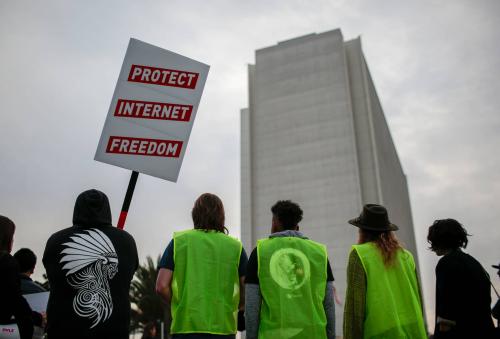The National Telecommunications & Administration of the Department Commerce on Friday announced a plan to shift responsibility for overseeing the Internet Corporation for Assigned Names and Numbers (ICANN) to “the global multistakeholder community.” This plan reflects a strong commitment to keeping the technical operations of the Internet in the hands of its nongovernmental community and out of the hands of governmental bodies.
ICANN aside, the key institutions that set these technical ground rules – the Internet Engineering Task Force (IETF) and its Internet Architecture Board, the Internet Society, the Worldwide Web Consortium (W3C) – operate as non-governmental, multi-stakeholder, multi-national, and community-driven bodies. There’s a mouthful of hyphens in those adjectives, but they fit the Internet’s diverse and fluid characteristics. These organizations make up a moveable feast of technical experts and, like the Internet, they have become global: for example, only about one-third of W3C members are American and the IETF is chaired by a Finn.
The ICANN transition will apply the same model across the board and complete the spinoff of the Internet from government that began in 1998, when ICANN was established and responsibility for overseeing the domain name internet registry systems was moved from the Defense Advanced Research Agency (DARPA) to Commerce. This moved the Internet fully into the civilian world and reflected the principles in the 1997 U.S. Framework for E-Commerce declaring that the development of the Internet should be led by the private sector with a minimum of government involvement.
NTIA’s commitment to these principles has helped to shield the Internet from regulation by government, whether in the United or elsewhere. Its three-year contracts with ICANN don’t involve NTIA directly in managing the domain name system but spell out ICANN’s responsibilities, including the importance of working with global stakeholders. As Daniel Castro of the Information Technology and Internet Foundation points out, the NTIA contracts have helped hold ICANN accountable.
Nevertheless, NTIA’s role in ICANN has taken on heavy symbolic freight way out of proportion to its value. While there is nothing in the role that enables any of the NSA surveillance revealed by Edward Snowden, the existence of this U.S. government role feeds a perception that the United States is somehow manipulating the Internet for its own economic and strategic advantage. It’s not a perception on the part of foreigners only: in criticizing NTIA’s decision, Newt Gingrich described it as “giving up control of the Internet.”
The U.S. does not have “control of the Internet.” Along with other countries for which the free flow of information, ideas, and innovation matter, it does have a large stake in continuing to protect the Internet from government control. Relinquishing NTIA’s residual role will makes that job easier.



Commentary
Internet Corporation for Assigned Names and Numbers (ICANN) Shifting Responsibility to “Global Multistakeholder Community”
March 15, 2014